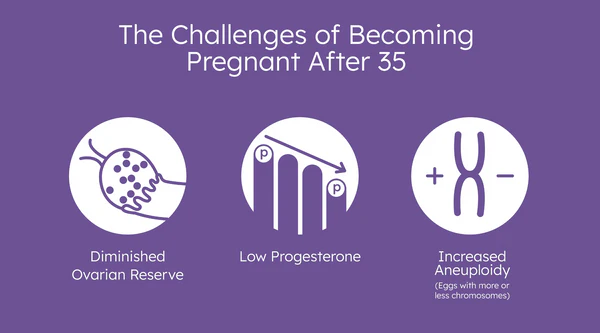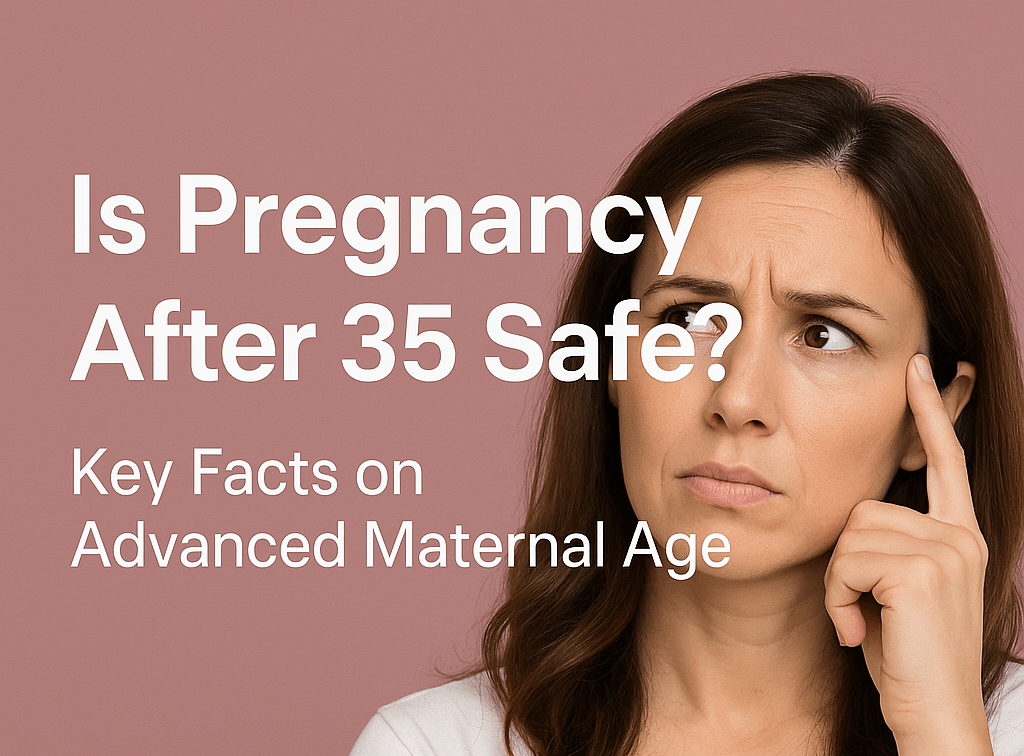so, you’re 35 or older and either trying to get pregnant or already expecting? First of all—huge congratulations! You’re definitely not alone in this. In fact, pregnancy after 35 is more common than ever before, especially as more women choose to start families later in life due to career goals, personal growth, or simply waiting for the right moment. But with that choice often comes a lot of emotions—some exciting, some overwhelming. There’s also a flood of information (and misinformation) floating around. In this guide, we’ll walk through the real experience of pregnancy after 35: the facts, the myths, the risks, and the amazing upsides that rarely get talked about.
What Does Pregnancy After 35 Actually Mean?
In medical terms, a pregnancy where the woman is 35 years or older at the time of delivery is called a pregnancy of “advanced maternal age.” Sounds a bit dramatic, right? But don’t let the label scare you.
It doesn’t automatically mean your pregnancy is high-risk or complicated—it just means your doctor might pay a little closer attention to certain health factors. And honestly, that’s a good thing.
Common Myths About Pregnancy After 35
Let’s bust a few myths before we go any further. Because trust me, there are plenty of them out there.
- ❌ You can’t get pregnant naturally after 35 – Not true. Many women still conceive naturally in their late 30s and even early 40s.
- ❌ Every pregnancy after 35 is high-risk – Yes, some risks do go up, but that doesn’t mean complications are guaranteed.
- ❌ You’ll definitely need IVF – Nope. Plenty of women don’t need any fertility treatments at all.
- ❌ Your baby will have birth defects – While risks like Down syndrome do increase with age, the majority of babies born to women over 35 are perfectly healthy.
Why Fertility Declines After 35—And What That Means
It’s no secret: our fertility isn’t infinite. As women age, both the number and quality of eggs naturally decline. This can make conception a bit trickier—but not impossible.
Also, hormone levels may start to fluctuate, which can affect ovulation. That’s why pregnancy after 35 might take a little more time and intention. But it’s definitely doable.
👨🦱 Don’t Forget About Male Fertility Too
Many people forget this part—but sperm quality can also decline, especially after age 40. So if you’re trying to conceive, it’s helpful for your partner to get checked out as well.
Risks of Pregnancy After 35: The Honest Truth
Okay, now let’s get real. Yes, there are some increased risks that come with pregnancy after 35. But knowing what to expect helps you stay proactive and prepared.
⚠️ Risks to Know:
- Fertility decline: It may take longer to conceive.
- Miscarriage risk: Slightly higher due to chromosomal issues.
- Genetic conditions: Increased risk of things like Down syndrome.
- Gestational diabetes: More common after 35, but very manageable.
- High blood pressure/preeclampsia: Needs to be monitored closely.
- Premature birth or low birth weight: Slightly more likely, but preventable with good care.
- C-section delivery: Women over 35 are a bit more likely to have C-sections, often due to precautionary reasons.
But here’s the key thing: modern prenatal care has come a long way. With regular check-ups and a healthy lifestyle, most women over 35 go on to have healthy, happy pregnancies.
Benefits of Pregnancy After 35 That No One Talks About
Let’s flip the script for a second. Because while the world loves to talk about the risks, there are some serious perks to becoming a parent a little later in life.
💛 1. Emotional Maturity = Calmer Parenting
By the time you hit your mid-30s, chances are you’ve been through some things. That life experience often translates into more patience, better communication, and less drama—which can make for a calmer, more thoughtful parenting approach.
💰 2. Financial Stability
Let’s face it—babies are expensive. Many women over 35 are in a more financially secure place than they were in their 20s. That means less stress about money and more focus on enjoying your growing family.
🧠 3. You Know Yourself Better
One of the biggest gifts of getting older? Self-awareness. You probably have a stronger sense of your values, your boundaries, and how you want to raise your child.
💕 4. Relationships Are Often Stronger
Whether you’re partnered or single, chances are your relationships are more stable and grounded by 35. You’ve had time to build trust and communication skills—super important when you’re parenting as a team (or even solo).
🌱 5. More Intentional Parenting
Most women who have a pregnancy after 35 made the choice thoughtfully. That intentionality often carries into parenting—you’re likely to be more mindful, more present, and more appreciative of the journey.
How to Have a Healthy Pregnancy After 35
Here’s how to boost your chances of a smooth pregnancy and birth after 35:
✅ 1. Get a Preconception Check-Up
Before trying to conceive, visit your doctor to assess your overall health. Get your thyroid, blood pressure, and reproductive health checked.
✅ 2. Eat Well & Move Your Body
Eat lots of colorful fruits, vegetables, lean protein, and whole grains. Keep moving with gentle exercise like walking, swimming, or prenatal yoga.
✅ 3. Take Prenatal Vitamins Early
Start folic acid and prenatal supplements at least 1–3 months before trying to conceive to reduce the risk of birth defects.
✅ 4. Cut the Bad Stuff
Avoid smoking, limit caffeine, and stop drinking alcohol. These things can lower fertility and raise pregnancy risks.
✅ 5. De-Stress
Try journaling, meditation, support groups, or even therapy. Mental health matters just as much as physical health.
Struggling to Conceive After 35? You’re Not Alone

If you’ve been trying to conceive for 6 months without success, it’s time to see a fertility expert. There’s no shame in getting help—in fact, it can save you time and emotional energy.
🌟 Common Fertility Treatments Include:
- Ovulation tracking and hormone tests
- IUI (Intrauterine Insemination)
- IVF (In-Vitro Fertilization)
- Egg freezing for future planning
At Ayuh Fertility Centre, you’ll find expert guidance tailored to your age and reproductive needs. Their personalized care has helped countless women over 35 achieve their dreams of motherhood.
Real Stories of Pregnancy After 35
You’ve probably heard about celebrities like Halle Berry and Janet Jackson having babies well into their 40s. But beyond the headlines, there are millions of women around the world choosing motherhood later—and doing it with confidence.
From corporate professionals to artists to single moms by choice, pregnancy after 35 is being redefined by strong, empowered women from every walk of life.
FAQs: Pregnancy After 35
1. Is pregnancy after 35 automatically high-risk?
Not necessarily. It’s considered “higher-risk” only because some medical conditions are slightly more common. But that doesn’t mean you’ll definitely face complications. Many women over 35 have completely normal, healthy pregnancies with the right prenatal care and lifestyle habits.
2. How long does it usually take to get pregnant after 35?
It depends on your body, but fertility does decline with age. On average, women over 35 might take 6–12 months to conceive naturally. If you’ve been trying for 6 months without results, it’s a good idea to consult a fertility specialist to explore options.
3. Can I get pregnant naturally after 35?
Yes, definitely. While it may take a little longer due to lower egg quantity and quality, natural conception is still very possible. Many women conceive without medical help well into their late 30s or early 40s.
4. Are the chances of miscarriage higher after 35?
Yes, the risk of miscarriage does increase slightly—mostly because of chromosomal abnormalities that can become more common with age. But early screening, healthy lifestyle choices, and medical support can help reduce the risk.
5. What are the chances of genetic issues like Down syndrome?
The risk increases with age, but even at 35, the majority of pregnancies result in healthy babies. Non-invasive prenatal testing (NIPT) and diagnostic tools like amniocentesis can help detect issues early if needed.
Conclusion: Is Pregnancy After 35 Safe?
Yes—pregnancy after 35 is safe when you have the right support, health habits, and prenatal care. Sure, there are a few more checkboxes to tick, but millions of women do it successfully every year.
You’re wiser, stronger, and more ready than you probably think. Your age doesn’t define your ability to be a great parent—it’s just part of your unique story.
💙 Need Support for Pregnancy After 35?
If you’re planning a baby or facing challenges conceiving, don’t wait. Ayuh Fertility Centre offers compassionate, expert care for women over 35 looking to start or grow their families. Schedule a consultation and take your first step toward joyful motherhood—at any age.


